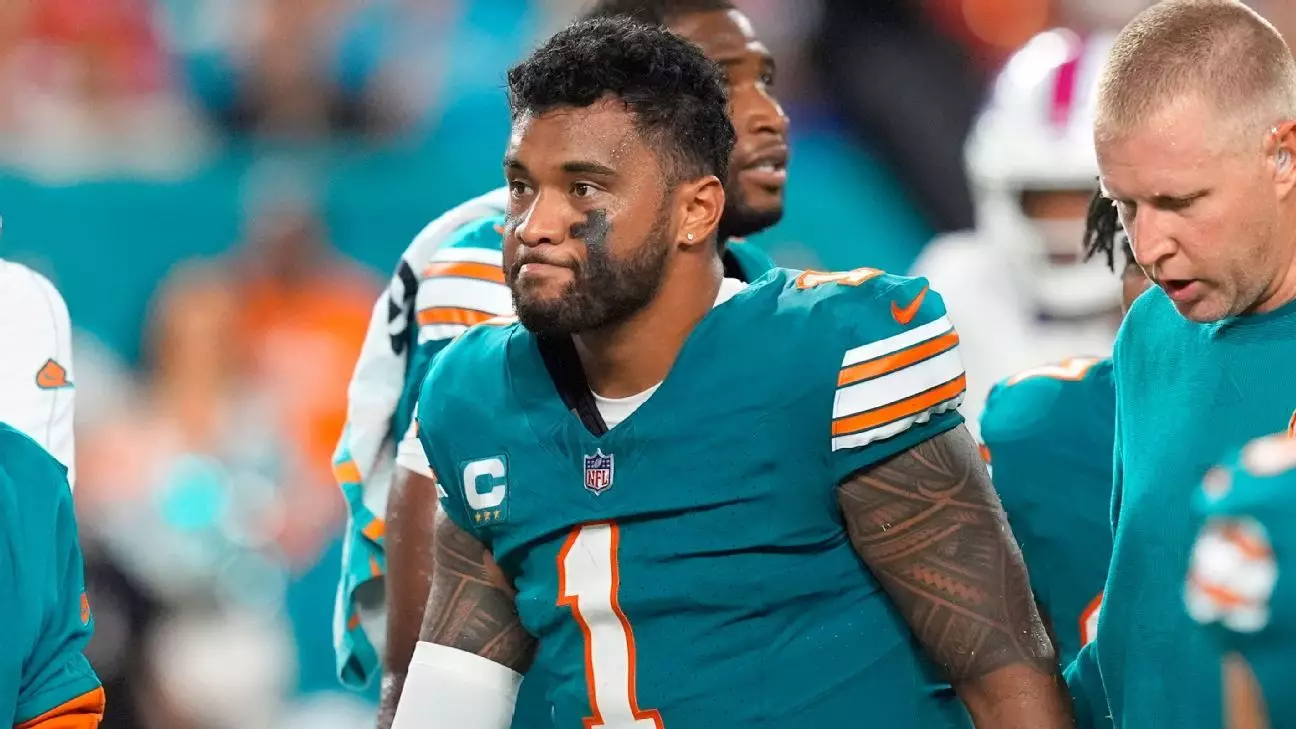In the high-stakes world of the NFL, player health is of utmost priority, yet the reality of injuries, particularly concussions, looms large. The Miami Dolphins have found themselves grappling with this harsh reality after quarterback Tua Tagovailoa sustained a concerning concussion during a recent matchup against the Buffalo Bills. This incident marks the third diagnosed concussion of his professional career—a stark reminder of the risks that come with playing a high-impact sport. As Tagovailoa heads to injured reserve for an indefinite period, the Dolphins not only face a significant gap in their roster but must also navigate the broader implications of player safety and recovery.
Tagovailoa’s current medical predicament stems from a play that saw him scrambling for a crucial first down, only to meet Bills safety Damar Hamlin with a forceful collision. The aftermath was alarming, as Tagovailoa exhibited a “fencing response”—a common reaction to head injuries in which the arms adopt unnatural positions. While this is a common and well-recognized sign of concussive symptoms, it raises immediate concerns about the quarterback’s long-term health. Having been ruled out for at least four games due to NFL regulations regarding injured reserve, he joins an unfortunate list of players whose careers have been punctuated by injuries. This adds to Tagovailoa’s frustrating history, as he has missed a substantial number of games—14 since 2020—due to various injuries.
In light of Tagovailoa’s absence, the Dolphins have made proactive decisions to reinforce their quarterback lineup. The team has signed Tyler Huntley from the Baltimore Ravens’ practice squad, indicating that they are serious about ensuring depth in their roster as they move forward. Huntley, who has started ten games throughout his four-year career, brings with him playoff experience and Pro Bowl recognition. While Huntley’s addition may seem immediate, it speaks volumes about the franchise’s approach to unforeseen changes in their roster.
Head coach Mike McDaniel has emphasized the unpredictability of injuries, illustrating how quickly a team’s depth can come into question. He articulated that the decision to sign Huntley was not a direct critique of their current backup, Skylar Thompson. Instead, it symbolizes a commitment to safeguarding the team’s competitiveness. With Thompson set to start against the Seattle Seahawks, his inexperience this season juxtaposes against Huntley’s history of stepping up in critical situations, bringing some stabilizing energy to the quarterback room.
The Ripple Effects in the Dolphins’ Offense
The ramifications of Tagovailoa’s injury extend beyond mere numbers on a roster. The Dolphins’ offensive playbook has been tailored to leverage Tagovailoa’s unique skill set, which now requires rapid adaptation under Thompson’s leadership. Thompson, who filled in admirably during his rookie season, has yet to take the field in 2023. The transition to a new quarterback can be a delicate dance, affecting offensive dynamics, timing, and execution.
Moreover, with a lack of game experience this season, the pressure on Thompson to deliver in a must-win situation against the Seahawks will be immense. The team’s success may hinge on Thompson’s ability to quickly foster chemistry with the receiving corps while also instilling confidence among offensive linemen who must protect him amidst a potentially tumultuous environment.
As the Dolphins forge ahead through this challenging period, one fundamental truth remains: prioritizing player health is paramount. The franchise must navigate its immediate needs while ensuring Tagovailoa’s long-term recovery is handled with care, a consideration that reverberates throughout the organization. The complexities of concussion management demand a meticulous approach, emphasizing medical input and player input alike.
Ultimately, the journey forward for both Tagovailoa and the Dolphins will hinge on how they balance competitiveness with a staunch commitment to the safety and health of their players. In a league where injuries are commonplace, the Dolphins’ management strategies will be closely watched as they strive not only for victory on the field but to safeguard the well-being of their athletes long after the final whistle.


Leave a Reply